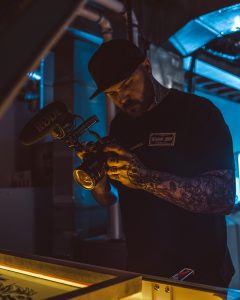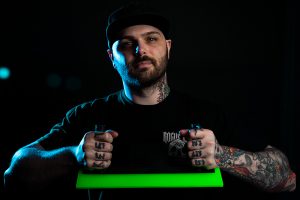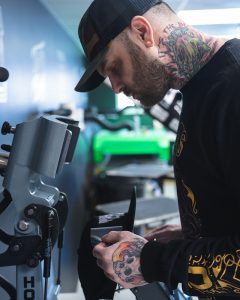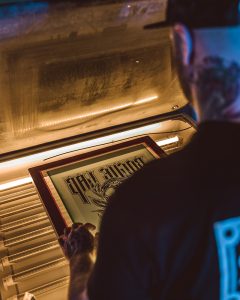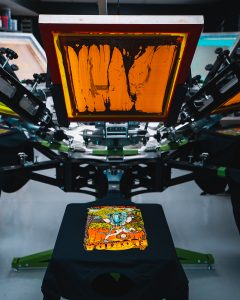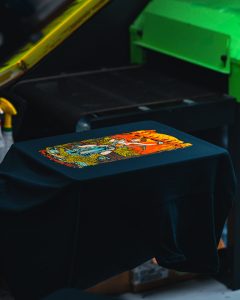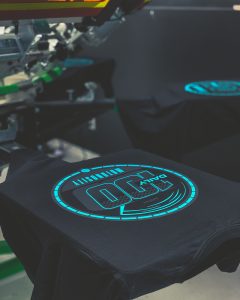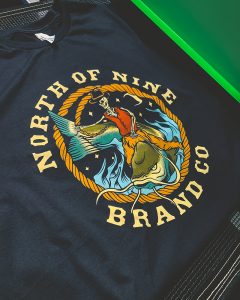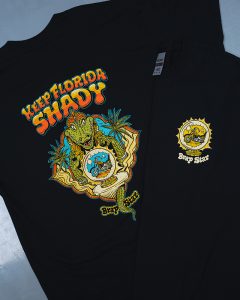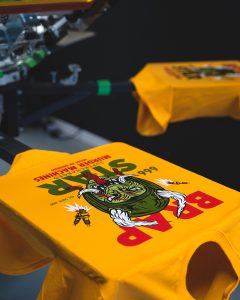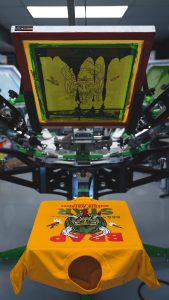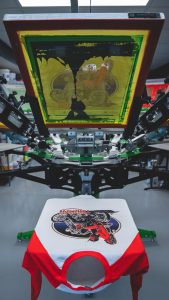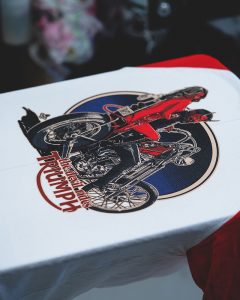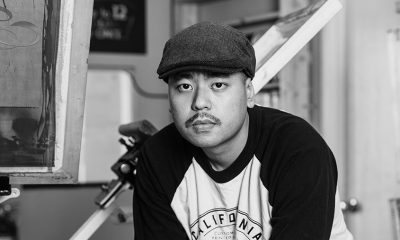Lee Stuart
Owner / Rogue Lab, Winnipeg, Manitoba, Canada
roguelabmfg.com
Q: Can you share how you went from being active in motocross to tearing your house apart and turning it into a fully functional print shop to upgrading to a larger, automated shop?
LS: I spent about 12 years as a professional motorcycle and snowmobile rider, so I was around a lot of the big brand names in the industry and always wanted to start a brand of my own one day. A few years after I hung it all up I decided to launch my first little clothing brand, and was running into issues with almost all of my local printers in one way or another. Quality was the biggest problem for me because I’m a borderline crazy person when it comes to the details. There were constant issues with mishandled artwork, under cured prints, and fibrillation that was so bad they might as well have been printing braille.
I had finally had enough and thought to myself that nobody is going to care about my product as much as I do, so it’s time to take matters into my own hands. I had a fully finished basement that I wasn’t really using much, so the next day I started tearing out carpets and everything else in my path. After about a month of really hard work getting the space ready, I moved my first screen printing equipment in. I’m not one to half ass anything either. I didn’t start with small basic setup like a lot do. I took a huge risk and moved a pretty extensive manual shop package in there because I wanted no excuses not to do things at a high level right out of the gate. I initially thought I’m just going to be printing my own stuff, but people noticed my attention to detail and perfectionism and it quickly turned into a full blown print shop. I printed out of there for three years and made a lot of cool stuff before purchasing and moving into the property that I have now, which is in the process of being set up with my first auto.
Watch interview below.
Q: How has social media affected your career?
LS: Social media has played a massive role in my journey in the industry. When I decided to jump into screen printing I also decided I was going to document a lot of my journey along the way on YouTube. I noticed there wasn’t really a lot of entertaining or relatable content out there. It was mostly really dry tutorials and only three or four people were making content on a regular basis. I knew I could make something totally different than what was out there and thought people might enjoy it or it might help them in some way. So, I made a handful of videos from day one of my equipment showing up and getting it all put together, to learning how to put down my very first print, and those videos took off pretty quickly. People were definitely looking for the type of thing I was making as I gained tens of thousands of followers in a pretty short time without any sort of viral video or anything like that. So, I dove in head first and started cranking out content from there because I love making it.
Three years later, it’s helped or at least entertained a ton of printers both new and old, which is so cool to see. It’s helped make a name for myself and my business on a global scale, which is funny to think about considering I was working out of a basement. It’s brought in a ton of industry support and partnerships with companies like Ryonet, Stahls, Polyprint, Melco, and more, allowing me to test equipment and products and to create content that I otherwise couldn’t. And most recently this year it’s given me my own signature model squeegee through Ryonet and Ez Grip which I still can’t believe is a real thing. It’s so rad!
For others looking to grow their presence I will say authenticity is key. We live in a social media world where everyone just wants to show the highlight reel. They want everything to look like it’s happy and perfect all the time, but that isn’t real life… especially in this business. I’m not afraid to show when I fail or when something goes wrong. It’s a part of the story. It wasn’t something I had consciously thought up or planned, more like a happy accident, but that’s one of the things I noticed that people really connected with in my videos and other social content. I show what went wrong, try to figure out why, and hopefully fix the problem by the end of it. That stuff has a lot more value than any highlight reel in my opinion. In a world where everyone is trying so hard to look perfect, it’s easy to stand out by being imperfect.
Advertisement
Q: How has being multifaceted affected your business?
LS: We do so much more than screen printing. We do a ton of logo and merch design. I would say 90 percent of what we print is also designed here in house. We also offer vehicle wraps and other vinyl work, heat transfer, embroidery, and more to come this year. My goal has always been to create a one stop shop, mostly to keep things fun and interesting for myself because I love a challenge and love to learn. When it comes to the digital stuff, it all comes back to wanting to help other printers first and foremost. Not many out there have easy access to artwork assets that look cool, are easy to use, and more importantly, are print-ready. My lead designer Dan and myself both work hard on making sure whatever we put out is going to be quality and something that people are stoked about when they use it for the first time. This has turned into a pretty nice passive income stream for the business and it’s also very cool to see so many printers and designers out there using this stuff in their work.
PHOTO GALLERY (14 IMAGES)


 Case Studies2 months ago
Case Studies2 months ago
 Art, Ad, or Alchemy2 months ago
Art, Ad, or Alchemy2 months ago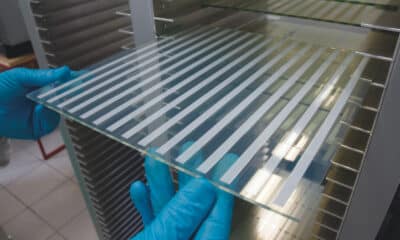
 Andy MacDougall2 months ago
Andy MacDougall2 months ago
 Columns4 weeks ago
Columns4 weeks ago
 Editor's Note3 weeks ago
Editor's Note3 weeks ago
 Marshall Atkinson3 weeks ago
Marshall Atkinson3 weeks ago
 Thomas Trimingham2 months ago
Thomas Trimingham2 months ago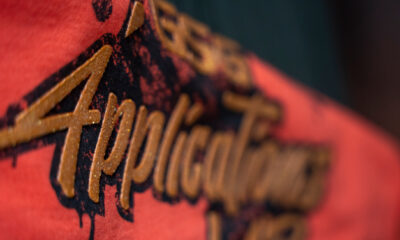
 Case Studies4 weeks ago
Case Studies4 weeks ago
